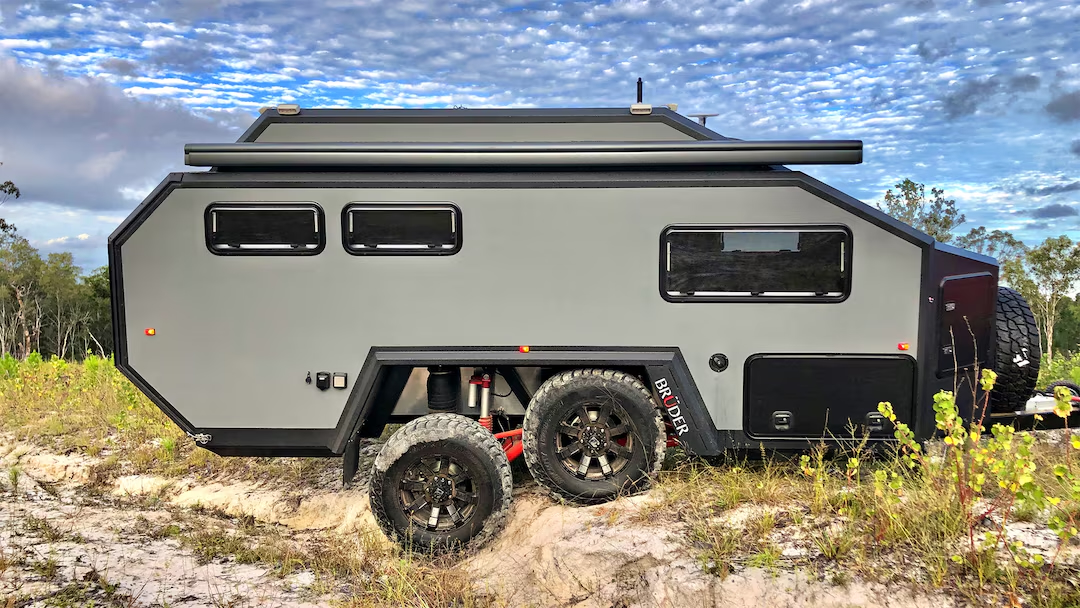
Imagine parking under the stars, miles away from civilization, with all the comforts of home nestled right inside your trailer. For those who love the freedom of life on the road but with a twist of adventure, living trailers have become a perfect choice. But in today’s world, choosing between a traditional trailer and an off-grid one is like deciding between a cozy campground and a self-sufficient sanctuary. Let’s dive into the differences that set traditional trailers and off-grid trailers worlds apart.
1. Power It Up: Hookups vs. Independence
When it comes to energy, traditional trailers and off-grid trailers take very different approaches:
Traditional Trailers: If you’re someone who enjoys the comforts of a campground, traditional trailers are designed to plug in and relax. With a shore power hookup, these trailers get all the juice they need from campgrounds or portable generators. You’ll be set for binge-watching a series or lighting up your little slice of paradise.
Off-Grid Trailers: On the other hand, off-grid trailers are the rebels of the trailer world. They come equipped with solar panels, large battery systems, and sometimes even wind turbines! This means you can charge up while basking in a secluded mountaintop sunset, miles away from the nearest power outlet. It’s the freedom to live off the land—without giving up electricity.
2. H2-Whoa: Water and Waste
Every adventurer knows that water is gold, and managing it is essential. Here’s how the two trailer types handle it:
Traditional Trailers: With a traditional trailer, water refills and waste disposal are regular pit stops. These trailers are equipped with standard water tanks and septic systems, so you’ll be visiting campgrounds or service stations every so often to refill and empty.
Off-Grid Trailers: For those off-grid, water is precious, so they’re built to go the extra mile. With larger water tanks, advanced filtration for drinking water from natural sources, and composting toilets, off-grid trailers let you wander longer without needing to stop. Imagine filling your tank from a river (filtered, of course) or having a composting toilet that eliminates the need for sewage tanks altogether. It’s the ultimate in independence.
3. Toughness Counts: Terrain-Ready Durability
Heading off the beaten path isn’t just about choosing a dirt road. It’s about being ready for whatever nature throws your way:
Traditional Trailers: Ideal for paved roads and more developed camping areas, these trailers balance comfort and weight. But if the road gets too bumpy, they’re more likely to ask, “Are we there yet?” than to tackle the rough terrain ahead.
Off-Grid Trailers: Built tough for adventure, off-grid trailers are designed for rocky, muddy, and steep paths. Reinforced frames, rugged suspension, and off-road tires make them ready to handle everything from mountain trails to desert dunes. These trailers are ready to go where traditional trailers dare not tread.
4. Climate Control: Keeping Cool (and Warm)
Temperature can make or break a trip, so staying comfortable is key:
Traditional Trailers: Traditional models often come with heating and cooling systems that rely on external power sources, so you’ll need to stay near a campground hookup to stay cozy or cool.
Off-Grid Trailers: Designed for all climates, off-grid trailers feature propane heaters, energy-efficient designs, and high-quality insulation. Some even boast passive solar designs or wood stoves to keep things warm without relying on a single plug-in. It’s camping with comfort, whether you’re in the mountains or the desert.
5. Budget Breakdown: Cost and Maintenance
Investing in a trailer is more than just the upfront cost; it’s about the long haul:
Traditional Trailers: These models tend to be more budget-friendly upfront, making them perfect for those who like a mix of adventure and the convenience of established campgrounds. But be prepared to budget for campsite fees if you’re relying on hookups.
Off-Grid Trailers: The higher initial price tag reflects all the rugged features and self-sufficient technology. While they cost more to begin with, off-grid trailers mean fewer ongoing expenses for power and water. You’re essentially investing in freedom—a cost that can save you over time.
Conclusion: Which Trailer Calls to You?
If you love the idea of rolling into a scenic campground, setting up with all the hookups, and enjoying the comfort of modern amenities, a traditional trailer might be your perfect match. It’s easy, convenient, and gives you the best of the “trailer life” without too many surprises.
But if you’re looking to escape, to blaze your own trail far from the familiar, an off-grid trailer offers a world of self-sufficient adventure. No hookups, no problem—you’ve got the power to camp where you please, with all the essentials built right in.
Whichever path you choose, living trailers open doors to new places and unforgettable adventures. And whether you plug in or go off-grid, the road to exploration awaits!




